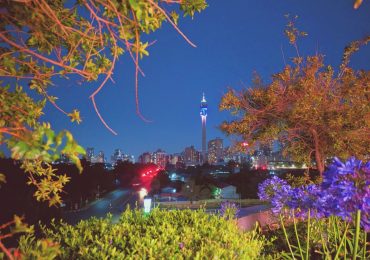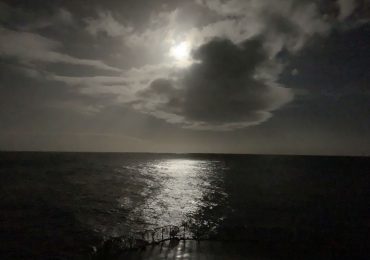Irenosen Okojie has won the AKO Caine Prize for African writing, for her story ‘Grace Jones’.
Announcing the award, chair of judges Kenneth Olumuyiwa Tharp said:
‘“Grace Jones” is a radical story that plays with logic, time and place. It defies convention as it unfolds a narrative that is both multilayered and multidimensional. It is risky, dazzling, imaginative and bold. It is intense and full of stunning prose. It is also a story that reflects African consciousness in the way it so seamlessly shifts dimensions, and it is a story that demonstrates extraordinary imagination. Most of all it is world-class writing, by an African writer.
‘At the heart of this story is its main protagonist, a young woman from Martinique living in London, who is moonlighting as a celebrity impersonator; her journey moves exquisitely and seamlessly between the exploration of the universal experiences of unspeakable suffering, pleasure and escape, and the particular experience of being Black and African in a global city such as London.
‘In the wake of the Black Lives Matter movement—which has prompted deeply powerful questions about race, justice and equality in the world today—this story offers a salient exploration of what it can mean to embody and perform Blackness in the world. This is a story of tremendously delicate power and beauty, and one in which we recognise the tradition of African storytelling and imagination at its finest.’
The Caine Prize is awarded annually to an African writer of a short story published in English.
The winner receives £10,000 prize money (about R210,000), and each shortlisted writer also receives £500.
Tharp said: ‘There were a few fundamental questions we were holding up to answer in how we selected the stories. We were looking for stories that were really original and striking in their own way. What do people most need to read, and why?’
Tharp pointed out that when the judging process began it was pre-Covid, it was pre-lockdown, and it was before the current iteration of the Black Lives Matter movement arose.
‘Throughout this process of reading and selecting the stories, these things have created an incredibly important context in which to consider what kind of story needs telling, and who’s telling it. I think that’s crucial, because for decades, if not for hundreds of years, the story has been told through a colonial lens,’ Tharp said.
‘It’s so important now that we have Africans telling the story of Africa and the Diaspora, and telling it in multidimensional ways that really capture the breadth and diversity of that experience. It is so important now that Africans own their own narrative.’
Okojie is a Nigerian British writer. Her debut novel Butterfly Fish won a Betty Trask award and was shortlisted for an Edinburgh International First Book Award. Her short stories have been published internationally, including in Salt’s Best British Short Stories 2017, Kwani? and The Year’s Best Weird Fiction. Her short story collection Speak Gigantular was shortlisted for the Edgehill Short Story Prize, the Jhalak Prize, the Saboteur Awards and nominated for a Shirley Jackson Award. She is a fellow of the Royal Society of Literature. Her new collection of stories, Nudibranch, featuring her winning story ‘Grace Jones’, was published in 2019.
‘It’s really, really phenomenal,’ Okojie said of her win. ‘It’s not something that I expected at all, because I always thought my writing was a little bit too weird for something like the Caine Prize.
‘But I think that this is wonderful because it means that my work gets introduced to an African audience, as well as an international audience. I think African countries can know a bit more about my work, because I don’t think that that’s happened so much for me. Obviously I’ve been published here and my books have been distributed in the US but not really in Africa. So this is wonderful, this is a great acknowledgement, and I’m chuffed to bits.’
This year, in light of the coronavirus pandemic and continuing travel restrictions, the Caine Prize commissioned British–Nigerian filmmaker Joseph A Adesunloye to direct and produce a documentary film to celebrate the shortlist and announce the winner.
Watch the video here:
Also on the Caine Prize shortlist for 2020 were Erica Sugo Anyadike (Tanzania) for ‘How to Marry An African President’, Chikodili Emelumadu (Nigeria and UK) for ‘What to do when your child brings home a Mami Wata’, Jowhor Ile (Nigeria) for ‘Fisherman’s Stew’, and Rémy Ngamije (Rwanda and Namibia) for ‘The Neighbourhood Watch’, published in The Johannesburg Review of Books.
The prize received entries from twenty-eight countries this year, including Angola/Cabinda, Botswana, Cameroon, Cote D’Ivoire, Democratic Republic of Congo, Egypt, Ethiopia, Ghana, Kenya, Libya, Malawi, Mauritius, Morocco, Nigeria, Namibia, Rwanda, Senegal, Sierra Leone, Somalia, South Africa, South Sudan, Sri Lanka, Sudan, Tanzania, The Gambia, Uganda, Zambia and Zimbabwe.
The shortlisted stories will be published in an anthology, alongside stories written at the Caine Prize workshop.
Last year’s Caine Prize winner was Nigerian writer Lesley Nneka Arimah, for her short story ‘Skinned’. Read our interview with Arimah here.
Related news:
- 2020 Caine Prize for African Writing shortlist announced—including Rémy Ngamije’s ‘The Neighbourhood Watch’, first published in The JRB
- Read: The AKO Caine Prize announces 2020 judging panel—and major new sponsorship deal
- Read: Nigerian writer Lesley Nneka Arimah wins the 2019 Caine Prize—‘We African writers must centre the African gaze’
- Read: ‘More weirdness, more work that’s unconcerned with explaining “Africa” to the West, more work that doesn’t care what people think. More of that, please.’—An interview with Caine Prize winner Lesley Nneka Arimah
- Read: Kenyan writer Makena Onjerika wins the 2018 Caine Prize for African Writing
- Read: ‘Language switching is the norm in Kenya; I just wrote the way we speak’—Makena Onjerika chats to The JRB about her Caine Prize success
- Read: The Caine Prize wasn’t what I thought it would be: Efemia Chela traces the real value of big literary prizes
- Read: ‘Writing is sometimes like a thread that weaves all our hearts into one’: Lidudumalingani reflects on his Caine Prize visit to the United States






One thought on “[The JRB Daily] ‘It is so important now that Africans own their own narrative’—Irenosen Okojie wins the 2020 Caine Prize for African Writing”